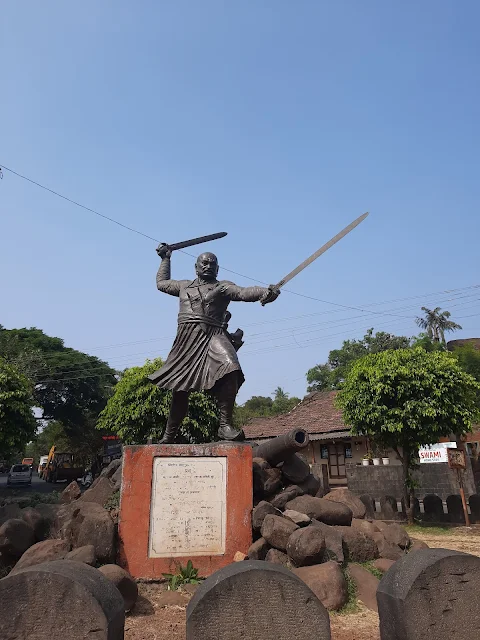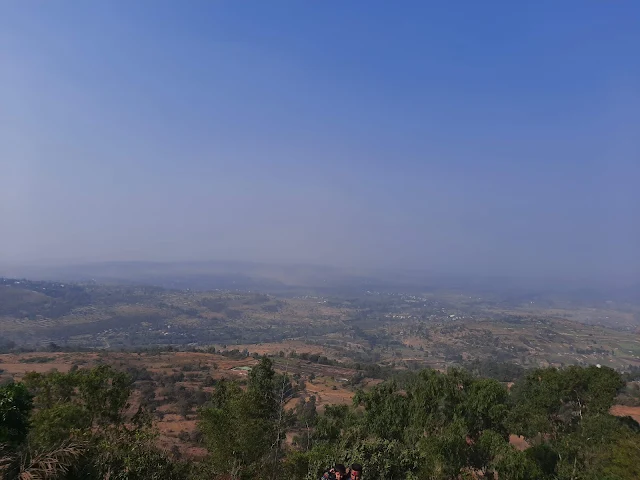We planned to visit Mahalaxmi temple at Kolhapur and Panhala fort on weekend, 8th January 2023, Sunday.
Panhala fort is 20 kilometers northwest of Kolhapur in Maharashtra. Due to its strategic location, it was the center of several battles in the Deccan involving the Marathas, the Mughals, the most notable being the Battle of Pawan Khind. The shape of fort is zigzagged hence it is called Panhala (Shape of Serpents).
History of the fort -
Panhala fort was built between 1178 and 1209 CE, by the Raja Bhoj. Gangu Teli is associated with this fort that led to the phrase “Kahan Raja Bhoj aur Kahan Gangu Teli.” On the establishment of the Adil Shahi dynasty of Bijapur in 1489, Panhala came under Bijapur and was fortified extensively. They built the strong ramparts and gateways of the fort which, according to tradition, took a hundred years to build.
In 1659, after the death of the Bijapur general Afzal Khan, Shivaji took Panhala from Bijapur. In May 1660, to win back the fort from Shivaji, Adil Shah sent his army under the command of Siddi Johar to lay siege to Panhala. Shivaji fought back and they could not take the fort. The siege continued for 5 months, at the end of which all provisions in the fort were exhausted and Shivaji was on the verge of being captured.
Under these circumstances, Shivaji decided that escape was the only option. He gathered a small number of soldiers along with his trusted commander Baji Prabhu Deshpande and, on 13 July 1660, they escaped in the dead of night to flee to Vishalgad. Baji Prabhu and Shiva Kashid, who looked like Shivaji, kept the enemy engaged, giving them an impression that Shiva Kashid was actually Shivaji. In the ensuing battle, almost three quarters of the one thousand strong force died, including Baji Prabhu himself. The fort went to Adil Shah. It was not until 1673 that Shivaji could occupy it permanently.
The Fort of Panhala has served as a place where Chhatrapati Shivaji Maharaj spent many days of his life. It is believed that Chhatrapti Shivaji Maharaj spent over 16 months of his life in the fort. Also Tarabai, the queen of Kolhapur spent her formative year in the fort.
We went to Narsobawadi (Nursinhwadi) on Saturday and stayed there. On Sunday morning we headed towards Kolhapur around 8.30 am after having breakfast at Trimurti Nashta Center and reached at Mahalaxmi temple around 10 am. After parking our vehicle at Bindu Chowk it took us 30 minutes to reach the temple. As it was Sunday there were rush at the temple, and we had to stand in the queue for more than an hour for darshan. After taking blessing from Mahalaxmi we went to Fadtare Misal which is very famous in Kolhapur. There were also waiting as the place is little small and there are 10-12 tables only. We waited for an hour and then enjoyed misal. I feel the place is overhyped as misal taste was ok and they serve breads. We reached at Bindu chowk where our car is parked by autorickshaw and started our journey towards Panhala and reached the fort around 2.30pm.
You don't need to climb the fort, you can visit complete fort by your own vehicle. Once we reached there few young folks came forward and asked if we need help to explore the fort and they were guides. We took guide who name was Kiran Karande, only because of him we could see most of the places in 2 hours as we had to leave Pune around 4pm.
 |
| Statue of Veer Baji Prabhu Deshpande |
As you enter Panhala, you see the huge statue of Baji Prabhu Deshpande. The legend is that he died battling thousands of enemy soldiers with few of his warriors so that Shivaji Maharaj could reach Vishalgad safely. At the entrance there is a statue of Veer Shiva Kashid.
 |
| Map of the fort |
The fortification of Panhala fort covers approximately 8 kilomteres, which define the approximately triangular zone of Panhala fort. The walls are protected for long sections by steep escarpments, reinforced by a parapet with slit holes. The remaining sections have 5-9 metro high ramparts without a parapet, strengthened by round bastions the most notable of which is Rajdindi.
 |
| Andhar Bav |
 |
| Shivaji Maharaj Temple, Panhala |
 |
| Ambarkhana |
 |
| Ganga Kothi |
 |
| Teen Darwaja (1) |
 |
| Teen Darwaja (2) |
 |
| Teen Darwaja (3, outer one) |
 |
| Masai Pathar seen from the fort |
 |
| Konkan side view from Dutondi Buruj |
Best time to visit Panhala Fort -
Best time to visit Panhala is in winter season when weather is pleasant. This occupies a prime place in the history of Maharashtra and is also a favorite destination as a hill station.

No comments:
Post a Comment